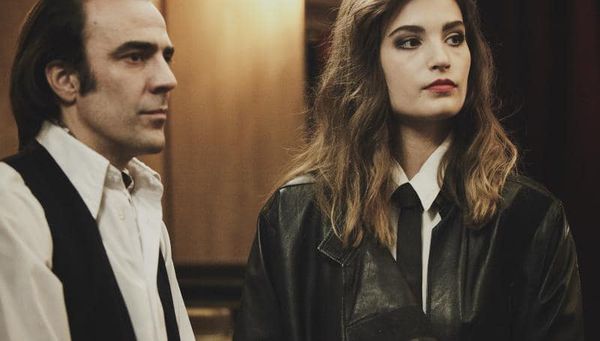 |
| Le Choc Du Futur |
Le Choc Du Futur (aka The Shock Of The Future but currently screening in the US under its French title) is the story of Ana (Alma Jodorowsky), a composer working in Paris in 1978, and her first encounter with electronic music. Capturing a moment of cultural flux, it also explores the art of composition and what it means to feel a deep rooted passion for music. Marc Collin has worked as a composer for many years, so when we met to talk about the film, I asked if he had begun by looking for a vehicle for musical ideas, or if what had driven the creation of the film was his desire to direct for the first time.
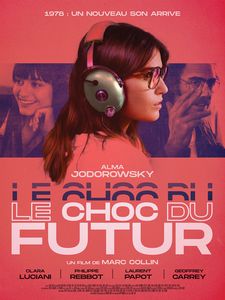 |
| Le Choc Du Futur poster |
“I really wanted to direct. It was really my goal for a long time, actually. I started to learn cinema, then I went into music for a long time. And a few years ago, I thought, now it's time to go back to cinema. But it took a lot of time to realise that I should just make a movie on music. So I wrote this script.”
Did he have a sense of what the music was going to be as he was filming?
“Yeah, absolutely. I thought I wanted to have a track that was a bit futuristic of that time, you know? Because to do that in ‘78 was very rare, especially in France. So I wanted to do other tracks that could be like, kind of new wave, you know, electronic wave like New Order, but before, like in 1978. And then I was doing a project actually, with this kind of sound for a singer. And suddenly, I thought, wow, I should just take this song because it’s perfect. So we would change a bit the lyrics and have the song.”
Was the history of French music, and electronic music coming to France, important to him personally?
“Yes – I would not say French music was so important for me, but I just, you know, I think it's better to talk about what you know. And I think it was a story to tell about the both female composers that was doing electronic music, like the Seventies, and to do this kind of music as a woman in France, at that time, I had to film in a way. And I think that I mean, you know, as a as a Parisian, why should I write this happening in Berlin or New York? It would have been strange.”
I ask if he thinks that people still know far too little about the women who helped to develop electronic music and he tells me that there’s a new documentary coming out about them any time now, so awareness is growing.
“It's coming. It's coming.. So I think it's a subject that more and more people are interested in. So I think it's pretty good. And I'm happy that my movie will be part of this rediscovery of these artists.”
We discuss something of what it was like for women working in the industry at that time.
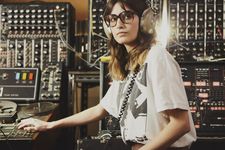 |
| Making music |
“Yeah, well, the thing that I have seen and you know that the whole thing that I read as well, as for a woman artist, is that if you look good and you want to do pop music, everybody will tell you, you should be you know, a singer or backing vocalist,” he says. “You know, nobody will tell you, you should be a producer or you should compose. That's what always struck me. That's changed. So I thought it would be good to tell this story. Because, yeah, it's a bit too easy for this industry to just put a woman you know, like, ‘Okay, you look good, you will be a singer or a front stage person,’ you know. And I have chosen a very beautiful actress, as well, to make that point because, of course, when you see her in the movie, you think, ‘Wow, it's incredible,’ because she's behind, she's in the shadow, you know. She doesn’t want to be a singer. She doesn’t want to be a star. She just wants to do her music.”
I note that I'm not aware of many films that have been made about modern composers – there are films about Mozart and Beethoven and so on, but very little exploring what life is like for a composer in the modern age.
“Yeah, for sure. I think there's a lot of movies about you know, Mozart and Bach. I thought that it would be good to show...because there's a lot of movies about jazz music. Well, not a lot, but there are some films about jazz music, like Bird, for example, and there are some movies about rock, you know. To tell the truth I had as well, the idea of the movie, when I saw this movie of Jim Jarmusch, Only Lovers Left Alive. Because there's a scene where the guy is in his bedroom and he's doing music, but he's really rock orientated, like drums, guitars. and all these things from the Sixties and Seventies. And I've never seen a movie that’s showing, actually, people that were doing electronic music in the past, I think it’s not existing. So I thought, let's do that. Because I want to see that. I want to see a really beautiful synth film. I’ve never seen that. So this is one of the reasons as well.
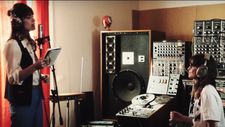 |
| Collaboration |
Le Choc Du Futur is also interesting as a film about the creative process. Was that something that he specifically wanted to do? And was it challenging to tell that kind of story?
“Yeah, what I wanted to show is this, what you said, the creative process, especially in pop music, because it's because I've been doing this for years, you know, and there’s a kind of magic in this, and people don't really know how it's happening. People are always thinking that, you know, the music is coming from nowhere, a kind of genius that gets the music in their hands. There is an energy that is, you know, free between some people that can be in a band, you know, or these two girls, you know, and it's a very cool, enjoy creative process, where there's an excitement, you know, you can propose an idea and you can have a really good song in very little time, in a way, you know. It's kind of easy because if you are inspired, and I wanted to show that. In a strange way – it’ funny – I was afraid that this sequence when the two girls are doing their music together, it's a long sequence, I think it's like probably more than five minutes. I was afraid it was too long, you know? And when I did it, I thought, maybe I can cut it. But everybody told me ‘No. That’s the best part of the movie.’ Because we have never seen that. You know, it's like a documentary, but if it were a documentary, we could not see that like that.”
How did he work with his actors to create the sense of enthusiasm which thy have in that and similar scenes?
Well, the thing is that I've chosen two actresses who are a singer and a songwriter, so they know about this. So it was really nice. We did maybe two or three takes maximum. And it was kind of improvised. I was so happy because I thought maybe it can be so boring, you know, so long, I don't know, if it’s not working. And I just remember I saw the first take and I was like, ‘okay, we're going to have it,’ because they were all together really playing the thing. And I wanted as well to show because in the movie, as you said, there's always the men that are coming and trying to seduce her, you know, and she's always trying to struggle somehow as the main character. And with this girl, she's really feel free, creative and free.”
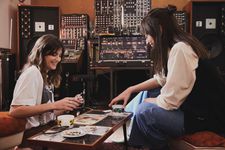 |
| Capturing the creative process |
Something else that really stands out about the film is the way it captures the look of the period, with the set decoration and the clothes people are wearing.
“I thought about the movie, like, I think I wrote the movie two years before the shooting started, because I have never done that to write something, and then...I don't like to ask people to work, yo think of something when we are not shooting the movie, because otherwise it's like, talking and talking for nothing. So suddenly I thought, ‘Okay, now we already, we know that we're going to shoot.’ I think we shot in March, February. And so I gathered a team in a very fast way. I think we gathered the team early January, we shoot in March. So I didn't have a lot of time to think about it, so I just gathered my friends, you know. The designer was an old friend and the girl that did the costume, she was she had never done that. But she likes costume. She likes the Seventies, she’s got a love of clothes. I said ‘Do you want to do that?’ and she said ‘Yes, sure.’ So it was a bit improvised. And with good friends around it was really nice.”
So was it a fun film to make?
“Oh, yeah, it was really fun. Everybody was telling me it should last longer – ‘We don't want to quit the shooting. We want to go on.’ Everything was was nice. We didn’t have any big problems. So we had a really good thing I was very happy with what they have done. It was good, because when we finished, we just wanted to another one. And we'll actually shoot another kind of documentary fiction next month.”
Responses to the film haven’t been perfect, he says, and he’s been disappointed by how it has been received in parts of the music press, but it has had some really positive responses and he feels that it’s likely to have a cult appeal in years to come – “because it's the kind of movie that, you know, you dream will exist.”





















